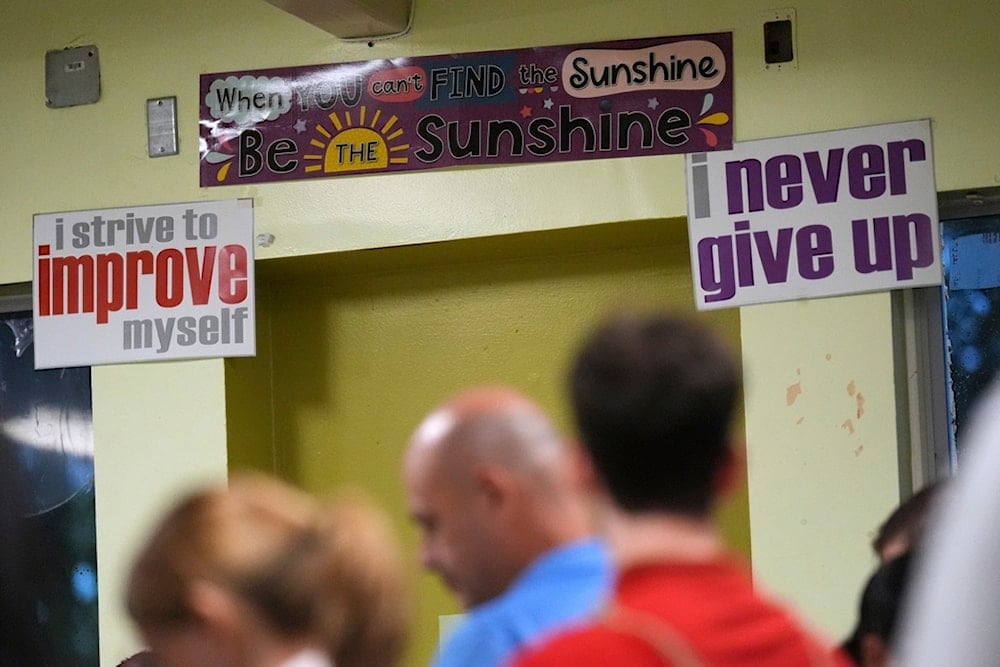Trump admin. rips Haitians of legal status, impacting over 500,000
The Trump administration's decision has prompted backlash from advocates who warn of mass deportations amid ongoing violence and humanitarian collapse in Haiti.
-

Inspirational messages hang on the wall in the Family Action Network Movement office during a press conference to denounce a recent Supreme Court decision that allows the Trump administration to strip humanitarian parole protection for more than 500,000 immigrants from Cuba, Haiti, Nicaragua, and Venezuela, Monday, June 2, 2025, in Miami (AP)
The United States will end Temporary Protected Status (TPS) for Haitian nationals, Homeland Security Secretary Kristi Noem announced on Friday; a decision expected to impact more than 520,000 individuals who have been living and working legally in the country. The designation is set to expire on August 3, 2025, with protections officially ending on September 2, 2025.
This move reverses an earlier decision by the Biden administration, which had extended the protections through February 2026. According to a statement from the Department of Homeland Security (DHS), the move is intended to reaffirm the temporary nature of the TPS program. "This decision restores integrity in our immigration system and ensures that Temporary Protective Status is actually temporary," a DHS spokesperson said.
The decision has caused widespread concern within Haitian communities and among immigration advocates, who argue the administration is turning its back on thousands of people facing life-threatening conditions if returned to Haiti. Tessa Petit, executive director of the Florida Immigrant Coalition and herself a Haitian immigrant, told Newsweek, "I'm still in shock, but I'm totally disgusted. This is a complete lie stating that the situation in Haiti has improved enough that it is safe for Haitian citizens to return home. This is a lie."
The Department of Homeland Security maintains that it conducted a full review in coordination with US Citizenship and Immigration Services and the Department of State, concluding that current circumstances in Haiti no longer justify the continuation of TPS.
Fractured return
But the situation on the ground in Haiti tells a different story. Since the assassination of President Jovenel Moïse in 2021, the country has suffered from a prolonged political crisis and a breakdown in law and order. Armed gangs now exert control over approximately 80 percent of the capital, Port-au-Prince. Widespread kidnappings, extortion, and armed clashes with security forces have displaced over a million people and pushed many more into poverty and hunger.
The humanitarian conditions are exacerbated by failing public infrastructure, rising food insecurity, and a healthcare system that has effectively collapsed in large parts of the country.
TPS for Haiti was first granted following the devastating 2010 earthquake, and for more than a decade, many of its recipients have built lives in the US, contributing to the economy, raising families, and establishing deep roots. The Migration Policy Institute estimated in 2023 that the Haitian-born population in the US ranges between 700,000 and 1.15 million, with over half a million benefiting from TPS.
Read more: Supreme Court lets Trump resume migrant deportations abroad
Deportation crisis
Advocates have warned that stripping this protection now will lead to mass deportations, break apart families, and send individuals back to a country in crisis. "We also know that TPS is not just based on environmental issues. It's also based on political unrest in the country. There are areas of Haiti that still have not recovered from the earthquake," Petit added. "This is honestly a complete lie and there has to be a way to stop this administration from sending people to their deaths."
In response to the backlash, a DHS spokesperson reiterated the administration’s stance, "The environmental situation in Haiti has improved enough that it is safe for Haitian citizens to return home. We encourage these individuals to take advantage of the Department's resources in returning to Haiti, which can be arranged through the CBP Home app. Haitian nationals may pursue lawful status through other immigration benefit requests, if eligible."
As legal challenges and advocacy efforts ramp up, Haitian communities across the US are bracing for a potentially devastating shift in immigration policy.

 4 Min Read
4 Min Read










